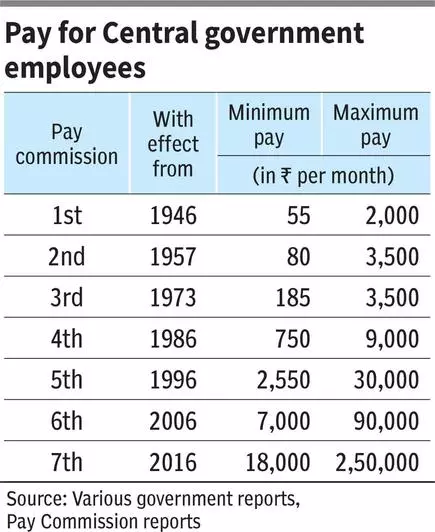Context:
Recently, the 8th Pay Commission has been approved by union cabinet, officially clearing its setup. This landmark decision aims to revise the pay scales of government employees, including adjustments to allowances like Dearness Allowance (DA).
· The move responds to the long-standing demand for pay revisions, aiming to improve the financial well-being of government employees and retirees.
Key Benefits of the 8th Pay Commission:
1. Increased Salaries: One of the most significant changes is the expected boost in basic salaries. This will directly impact the take-home pay of government employees, helping them manage rising living costs.
2. Enhanced Allowances: Along with the salary increases, allowances such as House Rent Allowance (HRA), Transport Allowance (TA), and DA will be adjusted in line with inflation. This ensures that government employees can maintain their standard of living despite economic fluctuations.
3. Improved Retirement Benefits: The revised pay structure will also enhance pension benefits, offering greater financial security for retirees, which is crucial for their post-retirement life.
4. Economic Boost: The increased disposable income of government employees is likely to stimulate consumer demand, contributing to overall economic growth.
The Commission is expected to positively impact approximately 67 lakh pensioners and 49 lakh Central Government employees. Basic salaries are anticipated to increase by 20% to 35%, leading to enhanced financial stability and improved living conditions for these employees. This pay revision is a significant step in addressing inflationary pressures and increasing the purchasing power of government staff.

About Pay Commission:
· The Pay Commission is a body set up by the Central Government to review and recommend changes to the salary structure of government employees. It assesses pay scales, allowances, and pensions to ensure they remain fair and competitive in the context of economic conditions.
· The first Pay Commission was set up in 1946, and since then, a total of seven pay commissions have been formed to revise and update the pay structure for government employees.
What are the recommendations of the 7th Pay Commission?
Key recommendations of the 7th Pay Commission include:
o Minimum Pay: ₹18,000 per month.
o Maximum Pay: ₹2,25,000 per month for the Apex Scale.
o New Pay Matrix: Replacing the old pay bands and grade pay system with a new pay matrix for greater transparency.
o Annual Increment: Retained at 3% per year.
o Dearness Allowance (DA): DA is based on inflation and adjusted regularly to offset rising costs.
About Dearness Allowance (DA):
DA is an allowance given to government employees and pensioners to offset the impact of inflation. It is calculated based on the All-India Consumer Price Index and varies depending on the region (urban, semi-urban, rural).






